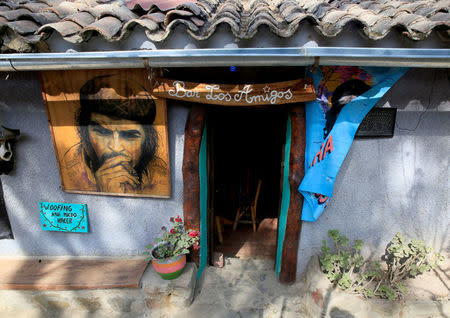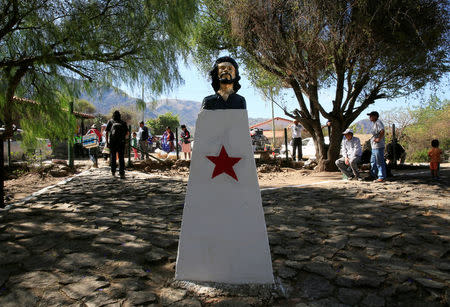Bolivia's Morales leads 'Che' homage 50 years after execution
By Daniel Ramos VALLEGRANDE, Bolivia (Reuters) - Thousands gathered on Monday in a small town in southern Bolivia, where the leader of the Cuban revolution Ernesto "Che" Guevara was executed by CIA-backed Bolivian soldiers 50 years earlier. Bolivia's President Evo Morales, one of few remaining leftist leaders in a region that has shifted to the political right, camped in a sleeping bag and tent and welcomed dignitaries from allies Cuba and Venezuela. "50 years later, the legend of Ernesto Che Guevara lives in the young people, in their unquestionable struggle for equality and liberation," Morales wrote on Twitter ahead of a scheduled speech. Over the weekend artists, activists, veterans of the Cuban revolution and Guevara's descendants gathered to commemorate the revolutionary hero in Vallegrande, where he was buried in a hidden, unmarked grave in 1967 before his remains were moved to Cuba 30 years later. The Argentine-born doctor met Fidel Castro in Mexico, where they trained and bought guns in preparation for the Cuban revolution before setting sail for the island on Nov. 25, 1956, to start the insurgency that toppled U.S.-backed dictator Fulgencio Batista two years later. Guevara rose to become one of the most important men in the rebel force and later in Cuba's revolutionary government, heading the central bank and industry ministry. He had hoped to replicate the revolution in Congo and then in Bolivia, but his call to arms largely failed and he was surrounded by U.S.-trained soldiers and caught in a ravine near La Higuera on Oct. 8, 1967. The next day he was taken to Vallegrande, 60 km (37 miles) away and Bolivia's then-President René Barrientos ordered his execution, avoiding a trial. Guevara was 39. His remains were exhumed and reburied in Santa Clara, Cuba, in 1997, when the Cuban Communism he helped build was struggling to survive after the Soviet Union collapsed. Commemorative ceremonies were held in Santa Clara on Sunday, and Cuba's Vice President Ramiro Valdés joined Morales in Bolivia on Monday. Guevara remains an anti-imperialist hero to many, especially in Latin America and Africa. In Cuba he is remembered for promoting unpaid voluntary work by toiling shirtless on building sites and hauling sacks of sugar. But in the town of Rosario, Argentina, where he was born, some residents have been collecting signatures to have his statue removed, protesting what they call his violent means to promote communism and lack of human rights in today's Cuba. (Writing by Caroline Stauffer; Editing by Jonathan Oatis)




